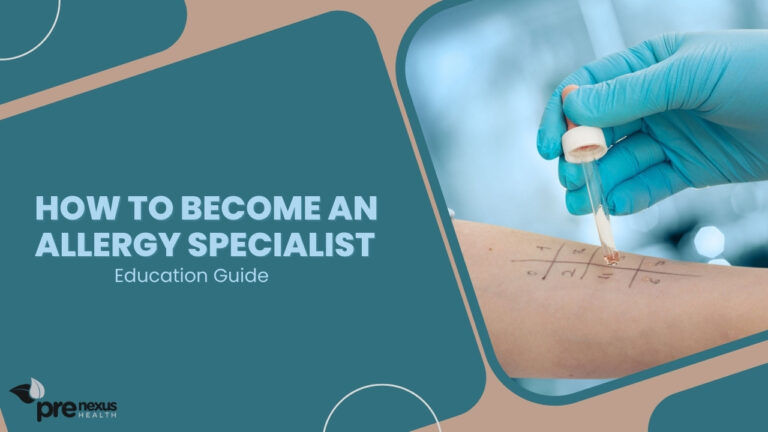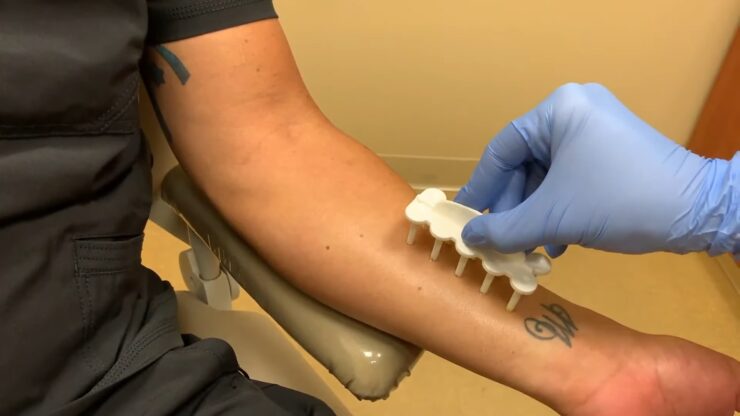Allergies can cause a lot of frustration, but also some more serious health issues. A lot of people are experiencing different types of allergies that can be influenced by food, spices, insects, plants, dust, and more.
There are also types that could affect our lives even more and prevent us from enjoying certain types of food, such as nut allergy, lactose intolerance, and more. You can read more about lactose intolerance and cow’s milk allergy here.
The only person who can help you when you are experiencing an allergy is the Allergist. It is a professional who knows how to recognize symptoms and provide the right type of medication for recovery and prevention of bigger side effects.
According to the statistics, there are over 50 million people in the US who are suffering from some form of allergy. Therefore, choosing to specialize in this area after medical school can be a great career path. In this article, I’ll provide more details about the process of becoming an allergy specialist.
What Is the Role of An Allergist?
The complexity of different allergies is vast. The allergen represents a substance that your body reacts to. In some cases, it can only lead to mild symptoms that won’t last long.
On the other hand, certain types that are more aggressive could lead to serious consequences or Anaphylaxis, which can, according to Cleveland Clinic, cause swelling, breathing difficulty, or even choking. Therefore, waiting for symptoms to disappear without taking any action is never a good approach.
That is where the allergist has a key role. This expert will use different steps to recognize the exact type of health issue and then provide the proper medication that will eliminate the side effects.
What is even more important is the fact that you will know about the main cause and start avoiding that particular type of allergen to avoid the same symptoms in the future.
The essential steps that these professionals are using are:
- Testing for allergies from different sources like food, drinks, mold, pets, pollen, and more
- Physical examination
- Providing accurate diagnose
- Analyzing lab results
- Prescribing the right medication
As you can see, finding out the main reason for an allergy is complicated, and it requires professional knowledge and experience.
Allergies in Elderly People Can Differ
It’s really important to shed light on a demographic often overlooked: the elderly. Allergies in older adults present a unique challenge, not only due to the physiological changes associated with aging but also because symptoms can often mimic other age-related conditions, like skin rash or severe breathing problems, leading to underdiagnosis or misdiagnosis.
In elderly patients, the immune system’s responsiveness diminishes over time, which can alter the presentation of allergic reactions compared to younger individuals. For example, respiratory allergies might not manifest with the typical symptoms seen in younger patients. The elderly are likely to be on multiple medications, raising the complexity of managing allergic reactions due to potential drug interactions.
An allergist plays a critical role in this context, employing a careful approach to diagnose and manage allergies in elderly patients. This includes taking a thorough patient history, considering the influence of comorbidities, and potentially adjusting treatment strategies to accommodate the unique needs of older adults.
Becoming a Specialist in this Area
The first thing that you must know is that this is not a straightforward process but a complex one that requires an advanced level of education. Also, your previous education is essential for further development.
The first step is to get a degree in medical school. Like with all other types of medical specialists, the exact field of medicine is chosen after getting a bachelor’s degree. During this time, you will learn more about a wide range of areas related to medicine, such as pharmacy, pathology, anatomy, physiology, and more.
The next step is to start working as an intern. In most cases, this period will last for another 3 years. The pediatrics residency is the most common choice for most students. Once you complete the residency, you can apply for a license as a doctor.
Once you reach the official title of doctor, you can start with your further specialization as an allergist. It will require at least 2 years of practice in this field, where you will learn a lot, mostly from real-life examples.
Continuous Learning
Keep in mind that getting a certificate does not mean that you are done with further development. That is one of the key features of medicine overall since it is constantly advancing due to new discoveries and innovations.
Therefore, you must be prepared to expand your knowledge, apply new methods of diagnostics, and implement new theories and discoveries. It is a process, I know, but quite an awarding one.
How Popular Is This Specialization?
I’ve noticed a significant increase in popularity in recent years. While it may not be as popular as plastic surgery, around 10% of all doctors are working in this area.
However, keep in mind that the number of available places for this position is often very limited. Therefore, having a backup solution is always the best approach so that you won’t waste your time.
What About the Salary?
As with any other field of medicine, you cannot expect to get a very high salary right from the start. Still, after spending a few years in the field and getting the right level of knowledge and experience, your career will also become profitable.
The average annual salary of allergy specialists is between $250,000 and $300,000. It is safe to say that it is an average amount of money when compared to other areas. For example, you will earn more than people working in the fields of endocrinology, infections, pediatrics, or internal medicine.
On the other hand, the salaries of experts in fields like neurological surgery and plastic surgery are still far away, with over $500,000 per year on average.
Last Words
The whole process of becoming an expert in this area of medicine will require passion, determination, and the ability to develop and adjust to changes all the time. When it comes to the accurate time required to become an allergist, this period won’t be shorter than 13 years since you will have to get a standard medical degree first.
Overall, completing a license will definitely ensure a profitable career considering the amount of people with various allergy issues.
Hey there, my name is Martha Robinson and I’m an experienced medical content writer. Initially, I wanted to become a pediatrician, but at one point I decided that writing is my passion. I’ve authored numerous pieces on various subjects, but my expertise lies in skin health








